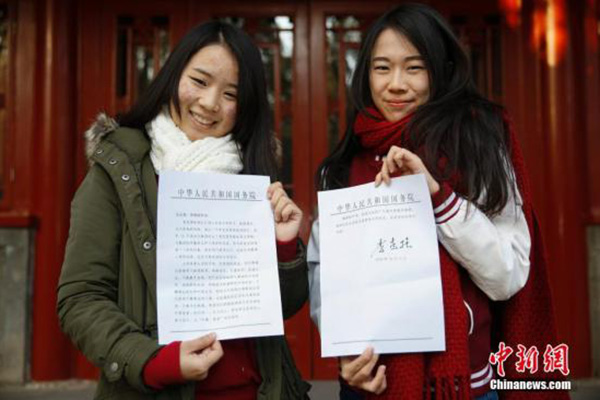
Two Thai freshmen at Peking University, Li Huimin (Left) and Bai Yunying, heard back from Premier Li Keqiang on Dec 17, less than two months after they wrote to him.[Photo/chinanews.com]
Two Thai freshmen at Peking University heard back from Premier Li Keqiang on Dec 17, less than two months after they wrote to him.
Bai Yunying and Li Huimin, two Thai women of Chinese descent, wrote to the Premier in October, but did not expect a reply. Li Huimin said she only wanted to convey her gratitude to the Premier — and it was the first time they had ever written to any state leader.
On Oct 13, 2013, Premier Li walked into the classroom at Chongfahsinseung School, Chiang Mai, Thailand, where the two young women were studying.
Bai told the Premier that her dream was to enter Peking University.
Li Huimin, who had always wanted to study in China, told Premier Li that she wanted to teach Chinese at a good college in Chiang Mai after graduating from university. She learnt from her teacher that the Chinese Premier graduated from the university.
“At first, we did not believe we would ever have the opportunity to go to China to study — as there is much competition — and because it’s Peking University,” said Li Huimin.
She also said that Premier Li offered them much encouragement. “As the Premier encouraged us, we studied more seriously.”
Three months later, Bai and Li Huimin were both invited to attend a local interview for admission to Peking University — and were exempted from taking written tests, due to their outstanding performances in the official Chinese language proficiency test.
They were accepted by the university in April.
After she started her course in September, Bai mentioned to her mother that she wanted to write a letter to thank Premier Li, and her mother supported her, saying it would be courteous to do so.
Liang Zhiwei, deputy inspector of the culture division under the Overseas Chinese Affairs Office of the State Council — the office that forwarded the women’s letters to Li — said that he was surprised by the speed of the Premier’s response.
Liang came to Peking University on Dec 17 to read the Premier’s reply to Bai and Li Huimin. A special gathering was arranged on campus, including 14 foreign students from Thailand and Malaysia. Li Yansong, the university’s vice president, also attended.
Li Yansong told the students that the letter from the Premier was of great significance for the development of the university — as the Premier’s action would perhaps help the university attract more international students.
Liang also referred to the “relatively long” letter, saying “not many state leaders would write a letter this long — replies are usually just brief instructions.”
In the letter, Premier Li mentioned his short conversations with the two students in Chiang Mai, saying their stories had made a deep impression on him.
He added that they had managed to gain admission to Peking University because of their own efforts — and that he hoped they could become a “cultural bridge” between the two countries.
“In Thailand, it is usually someone important that can expect to receive a letter from the Prime Minister,” said Bai Yunying.
In 2014, Premier Li Keqiang has written at least 11 letters in reply to various people from different walks of life — including three to villagers and six to students.
